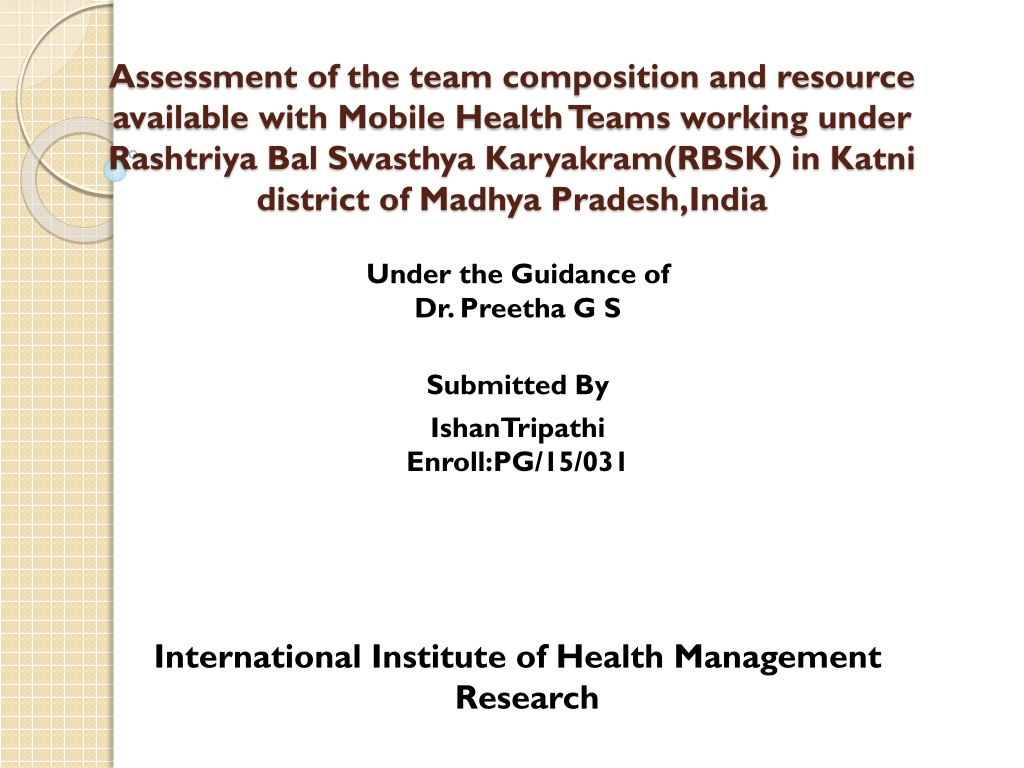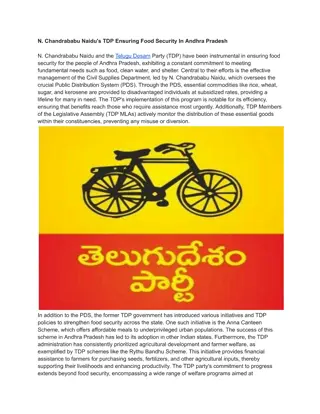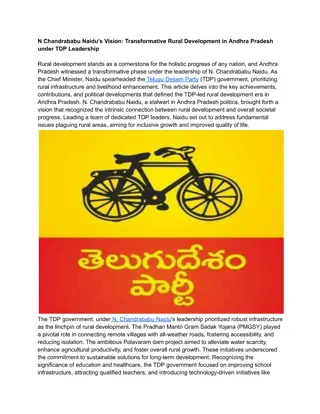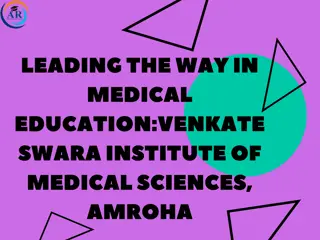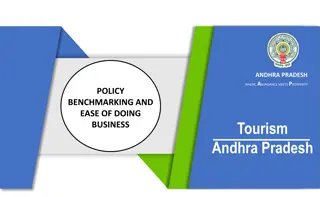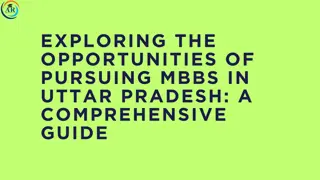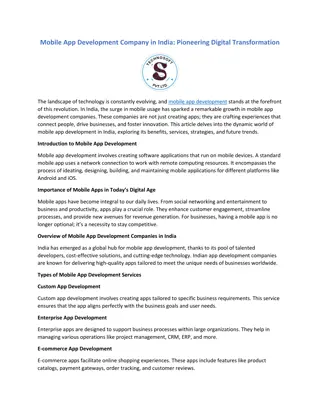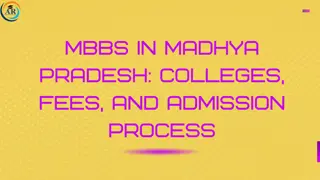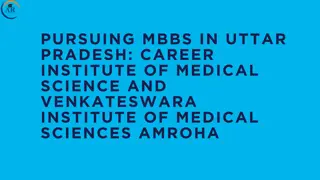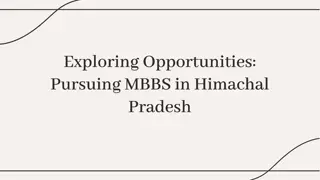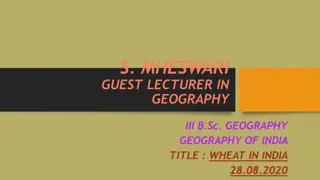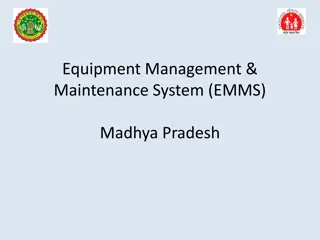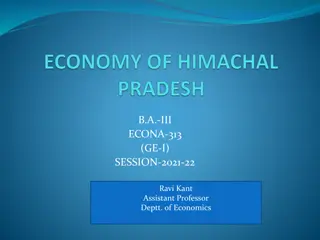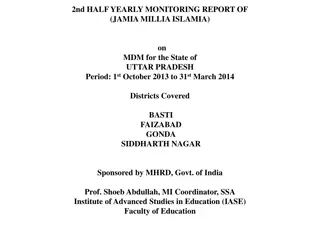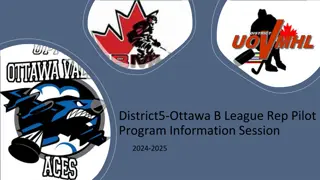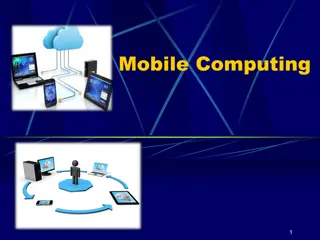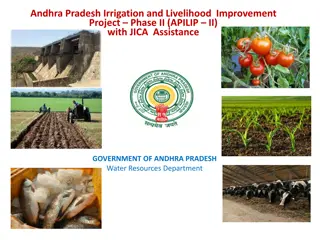Assessment of Mobile Health Teams under RBSK Program in Katni District, Madhya Pradesh, India
The study assesses the team composition and available resources of Mobile Health Teams operating under Rashtriya Bal Swasthya Karyakram (RBSK) in Katni district, Madhya Pradesh, India. It delves into the background of the National Health Mission, methodology, key findings, results interpretation, and conclusions drawn from the assessment. The study focuses on the critical importance of early intervention and screening for various health conditions in children. Through this evaluation, insights are provided on the composition of Mobile Health Teams and the necessary resources required for effective implementation of the RBSK program.
Download Presentation

Please find below an Image/Link to download the presentation.
The content on the website is provided AS IS for your information and personal use only. It may not be sold, licensed, or shared on other websites without obtaining consent from the author. Download presentation by click this link. If you encounter any issues during the download, it is possible that the publisher has removed the file from their server.
E N D
Presentation Transcript
Assessment of the team composition and resource available with Mobile Health Teams working under Rashtriya Bal Swasthya Karyakram(RBSK) in Katni district of Madhya Pradesh,India Under the Guidance of Dr. Preetha G S Submitted By IshanTripathi Enroll:PG/15/031 International Institute of Health Management Research
Content Background About the study Methodology Key Findings Result and interpretation Conclusion References
Background The National Health Mission (NHM) encompasses its two Sub-Missions, the National Rural Health Mission (NRHM) and the National Urban Health Mission (NUHM). The main programmatic components include Health system strengthening in rural and urban areas, Reproductive- Maternal-Neonatal-Child (RMNCH+A) and Communicable and Non-Communicable Diseases. Under the NRHM, the Empowered Action Group (EAG) States as well as North Eastern States,Jammu & Kashmir and Himachal Pradesh have been given special focus. and Adolescent Health
Introduction According to March of Dimes (2006), out of every 100 babies born in this country, annually, 6 to 7 have a birth defect. This would translate to around 17 lakh birth defects, annually, in the country and accounts for 9.6% of all the new- born deaths. Keeping this in view, the Ministry of Health and Family Welfare, introduced Child Health Screening and Early Intervention Services as Karyakram (RBSK) under the National Health Mission. Defects at Birth, Deficiencies, Diseases specific to childhood and Developmental disabilities, 4Ds , can either lead to untimely death of a child or a survival with poor developmental outcomes. Rashtriya Bal Swasthya delays including
Composition of Mobile Health Team S. No 1 Member Number MOs (1 Male, 1 Female) , could be AYUSH at least with a bachelor degree from an approved institution 2 2 3 ANM/SN Pharmacist* with proficiency in computer for data management 1 1 * In case a pharmacist is not available, other paramedics Lab Technician or ophthalmic assistant with proficiency in computer for data management may be considered.
Objective To assess the Team composition and Resources availability with functional Mobile Health Teams working under Rashtriya Bal Swasthya Karyakram (RBSK) in Katni district of Madhya Pradesh,India
Specific Objective To analyse the gap between the actual and prescribed number of functional Mobile Health Team in all six blocks of Katni district Madhya Pradesh. To analyse the gap between the actual and prescribed team composition of functional Mobile Health Team in all six blocks of Katni district Madhya Pradesh. To determine the availability of tool kit with the functional Mobile Health Team in all six blocks of Katni district Madhya Pradesh. To determine the availability of RBSK vehicle with the functional Mobile Health Team in all six blocks of Katni district Madhya Pradesh. To determine the availability of essential drugs with the functional Mobile Health Team at the time of screening in all six blocks of Katni distict, Madhya Pradesh. 1. 2. 3. 4. 5.
Methodology The study was performed to assess the team composition and resources available with Mobile Health Teams working under RBSK in Katni district of Madhya Pradesh. Study design: Observational Cross -sectional study Study area: All the Six blocks (Badwara, Bahoriband, Vijayraogarh, Umariapan, Rithi, Kanwara) of Katni district of Madhya Pradesh Study Population: Functional Mobile Health Teams working in all the Six blocks of district. Sample size: All the Nine team leaders of functional Mobile Health Teams of district. Sampling method: As the study population was small all Functional MHT were included in the study, no sampling was done and no sampling method is adopted. Study tool: Mapping tool were used to collect the data from MHTs Statistical methods: Excel 2007 is used to analyse the data Study period: 22 March 2017 to 06 May 2017
1. Block Having MHT as per Norms 2 teams 50% 50% 1 team
2. Teams composition 33% Incomplete Complete 67%
3.Availability of tool kit for screening: 3.Availability of Tool kit 11% 22% Yes Yes(incomplete) No 67%
4. Timely Availability of RBSK vehicle 33% Yes No 67%
5.Role out according to Micro plan: 11% Yes No 89%
Result Interpretation In Katni district 9 (75%) out of 12 Mobile Health Team was functional and 3( 25%) MHT was not functional due to lack of AYUSH Doctors and other staffs 3 blocks i.e. (50%) were having 2 MHTs as per RBSK norms whereas 3 blocks i.e. (50%) have only one team. Out of 9 functional MHTs only 3 MHT( 33% )were complete in terms of team composition as per RBSK norms 2 teams (22%) does not have tool kit for screening, 6 (67%) have incomplete tool kit with non functional equipments such as BP apparatus, Weight Machine, height scale and New born weighing machine. Only one team have complete tool kit which they have self purchased. Only 3 out of 9 team i.e. 33% get the RBSK vehiicle on time whereas 67% are not getting it on time. Only 1 team i.e. 11% is able to follow the microplan whereas 8 i.e. 89% are not able follow the microplan
Conclusion Out of 6 blocks 3 blocks i.e. 50% are not having Mobile health teams as per norms of RBSK i.e. 2 teams in each block. Out of 9 mobile health teams 6 i.e. 67% does not have complete team composition as per RBSK norms i.e. 1 male doctor, 1 female doctor, 1ANM and 1 pharmacist. Out of 9 Mobile Health teams 6 i.e. 67% are having incomplete tool kit which is essential for the screening of children under RBSK, 2 teams i.e. 22% does not have the tool kit. Out of 9 teams 6 teams i.e. 67% said that the RBSK vehicle is not available to them on time. Out of 9 teams 8 teams i.e. 89% are not able to work according to the microplan because of the other engagements at block level.
Recommendation Ensure 2 Mobile Health Teams a total of 12 in all the six blocks of District Katni. Ensure the complete composition of the teams working in blocks with 1Male Doctor, 1 Female Doctor, 1 ANM and 1 Pharmacist. Provide the tool kits for screening of children to Mobile Health Team every year and also maintain the quality of the equipments provided to the MHT so that the equipments can be used at its full efficiency. Ensure the availability of the RBSK vehicle to the Mobile Health Teams and also ensure that the vehicle empanelled under RBSK is nit used for some other purpose by other staffs except the RBSK Mobile Health Teams. Do not engage the Mobile Health Teams in any other work other than the screening so that they can perform their work of screening more efficiently. Recruitment of drop out and vacant staff post should be done as early as possible for quality screening.
References Operational guidelines Rastriya Bal swasthya karyakram (RBSK). Child Health Screening and Intervention Services under NRHM. Ministry of Health and Family welfare. 2013 Available at: http://nrhm.gov.in/images/pdf/programmes/RBSK/Resour ce_Documents/RBSK%20Resource%20Material.pdf RBSK resource material. Available at: http://nrhm.gov.in/images/pdf/programmes/RBSK/Resour ce_Documents/RBSK%20Resource%20Material.pdf 1. 2.
